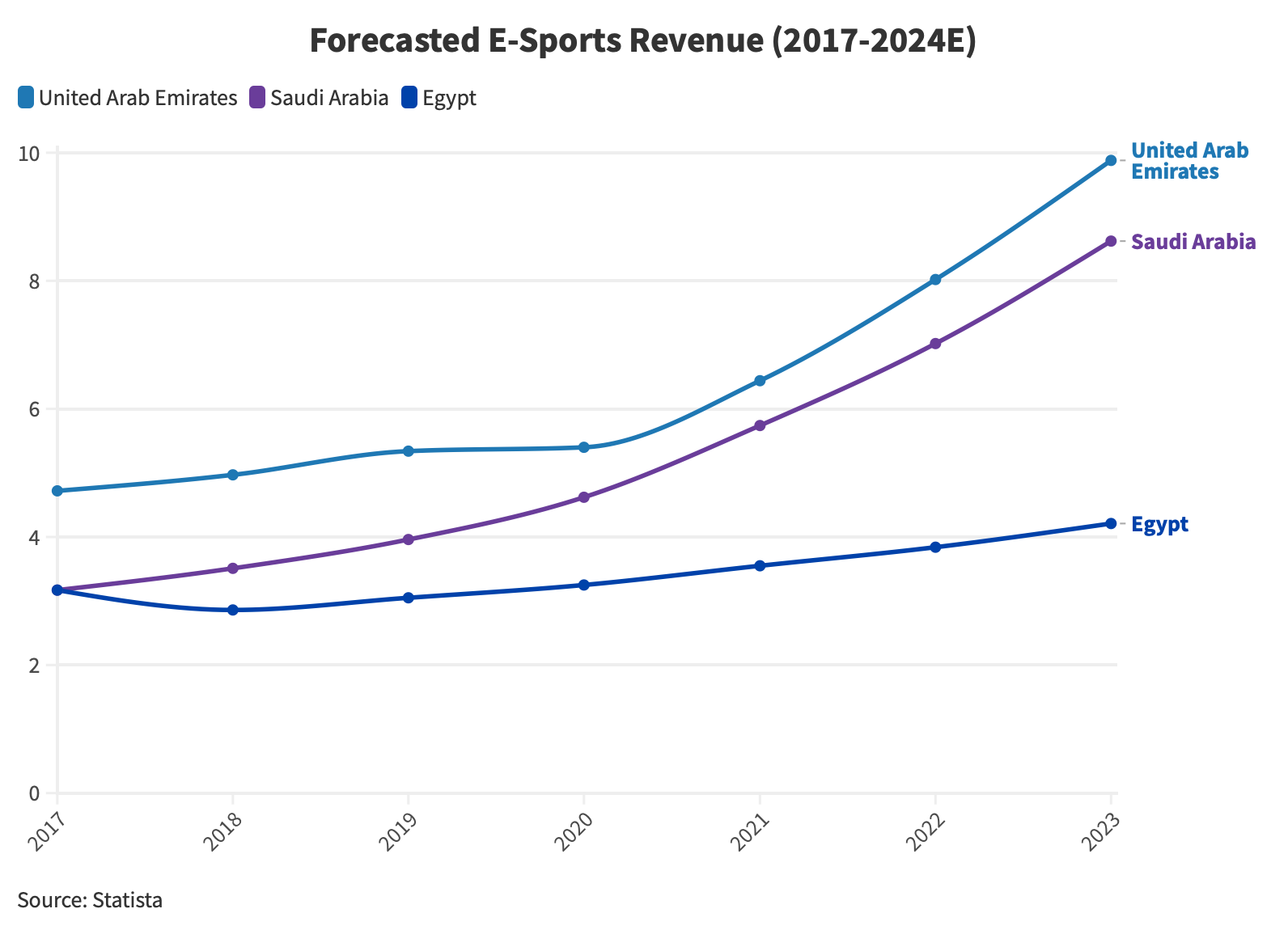eSports Sector on the Rise in the Middle East: Outlook, Major Players, and Prospects
As the eSports sector thrives in the Middle East, we delve into the region’s burgeoning gaming culture, governmental initiatives, standout players, and promising future.
By Giulia Interesse
Electronic sports (commonly known as “eSports”) encompass competitive video gaming where individuals or teams engage in head-to-head competitions playing popular games like Fortnite, League of Legends, and PUBG. The primary objective is to win substantial prize money, attracting a growing audience of spectators.
Data reveal that the global eSports market surpassed US$1.08 billion in value in 2021, with the majority of revenues derived from sponsorships and advertising (US$641 million), followed by media rights (US$192 million). By 2024, the global market revenue is expected to reach US$1.62 billion.
Together, Asia and the Middle East and North Africa, contribute to over 56 percent of the worldwide eSports market. As per findings from the MENA Gaming & eSports Summit 2023, the Middle East boasts a gaming community of more than 377 million players.
As eSports gain momentum, they are swiftly asserting dominance across the region, reshaping its gaming landscape and captivating enthusiasts from diverse backgrounds.
UAE, Saudi Arabia, and Egypt lead eSports in the Middle East and North Africa (MENA) region
The Middle East and North Africa (MENA) region present significant potential for eSports growth due to high mobile internet penetration, a large young population, and a strong interest in digital technologies. While Egypt hosts the largest gaming community, Saudi Arabia leads in gaming revenue and the United Arab Emirates (UAE) has the highest revenue per user.
In particular, projections indicate that the UAE and Saudi Arabia will lead in eSports revenue in MENA, driven by their high-income levels, public investments, and efforts to diversify their economies away from oil dependence. Saudi Arabia’s active interest in gaming and eSports has spurred rapid industry expansion, with major tournaments like the Dota 2 Riyadh Masters 2022 and the Gamers8 eSports Festival boasting multi-million-dollar prizes sponsored by global brands like LG, Mastercard, and Spotify.

Experts emphasize the conducive environment for eSports growth in MENA, highlighting the region’s large and engaged gaming population, especially in Saudi Arabia, and government support for eSports development. The COVID-19 pandemic has further accelerated industry growth, with more players joining the gaming scene and increased average playtimes. Additionally, the pandemic saw a surge in audience numbers, streaming, and viewership across eSports platforms.
Leading eSports teams and individual players
As the eSports sector gains momentum in the Middle East, we are witnessing the emergence of increasingly renowned teams and organizations.
One of the most prominent entities is YaLLa eSports, headquartered in Dubai, boasting sponsorship from industry giants like Intel, Burger King, and ASUS.
Team Falcons, hailing from Saudi Arabia, stands out as another powerhouse in the Middle Eastern eSports scene. Renowned for their prowess in games such as Rocket League, they won a third-place at the Gamers8 2022 tournament, showcasing their abilities on the international stage.
Among individual players, Jordan features a standout talent with winnings reaching an impressive US$4.8 million. Likewise, Lebanon’s top earner, Maroun (GH) Merhej, has gained substantial recognition for his eSports accomplishments, establishing himself as a formidable player both regionally and globally.
Government investment strategies to support the eSports industry
Governments across the Persian Gulf are investing heavily in both technological and “soft” infrastructure to bolster the eSports ecosystem. These efforts include immigration policies aimed at attracting a diverse talent pool spanning athletes, developers, publishers, and support staff – all vital for nurturing a thriving eSports sector.
The UAE and Saudi Arabia, in particular, are pursuing aggressive diversification strategies, channeling significant financial resources into initiatives aimed at reducing their reliance on oil. Notably, substantial funding is allocated to sectors like eSports and gaming, recognized as pivotal industries for engaging the region’s youth demographic.
In Dubai, for instance, the government is actively fostering the growth of the eSports sector with initiatives like the Dubai Programme for Gaming 2033. Led by Sheikh Hamdan bin Mohammed bin Rashid Al Maktoum, the Crown Prince of Dubai, this program aims to position Dubai among the top 10 cities globally in the eSports industry by 2033. It plans to achieve this goal by creating 30,000 new jobs in the sector over the next decade, aiming to boost the sector’s contribution to the emirate’s gross domestic product by nearly US$1 billion.
Saudi Arabia’s Public Investment Fund’s establishment of the Savvy Gaming Group is another key initiative in the region, signaling the country’s determination to lead in the eSports sphere. The kingdom has also announced that, following the development plan of Neom, the smart city project, it will also host the world’s largest center for games development.
Meanwhile, the UAE has been actively involved in eSports development for seven years, hosting large-scale competitions and integrating eSports into innovative projects like Abu Dhabi’s Al Qana complex.
The future of eSports in the Middle East
With the key ingredients of high internet penetration and a youthful population in place – about half of the populations of Saudi Arabia and the UAE, for example, are under 30 – the outlook for the sector in the Middle East is chock-full of opportunities for growth. Newzoo, a leading provider of eSports insights and analytics, forecasts a compound annual growth rate (CAGR) of 15.1 percent for the whole MENA region throughout 2024.
Looking ahead, the trajectory for eSports in the Middle East is set for continued growth. With a vision to become a global eSports hub, the region aims to attract more international tournaments, establish eSports leagues, and nurture homegrown talent through comprehensive training programs and academies. Foreign investors and businesses in this sector have plenty of opportunities to look forward to.





